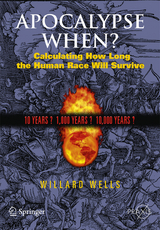Apocalypse When?
Calculating How Long the Human Race Will Survive
Seiten
2009
Springer-Verlag New York Inc.
978-0-387-09836-4 (ISBN)
Springer-Verlag New York Inc.
978-0-387-09836-4 (ISBN)
Any formula for predicting human survival will invite controversy. This book provides a unique analysis of the chances of human survivability in the short and long term. It develops a formula for survival based on four separate measures.
This book will be a key trailblazer in a new and upcoming field. The author’s predictive approach relies on simple and intuitive probability formulations that will appeal to readers with a modest knowledge of astronomy, mathematics, and statistics. Wells’ carefully erected theory stands on a sure footing and thus should serve as the basis of many rational predictions of survival in the face of not only natural disasters such as hits by asteroids or comets, but perhaps more surprisingly from man-made hazards arising from genetic engineering or robotics.
Any formula for predicting human survival will invite controversy. Dr Wells counters anticipated criticism with a thorough approach in which four lines of reasoning are used to arrive at the same survival formula. One uses empirical survival statistics for business firms and stage shows. Another is based on uncertainty of risk rates. The third, more abstract, invokes Laplace’s principle of insufficient reason and involves an observer’s random arrival in the lifetime of the entity (the human race) in question. The fourth uses Bayesian theory.
The author carefully explains and gives examples of the conditions under which his principle is valid and provides evidence that can counteract the arguments of critics who would reject it entirely. His deflection of possible criticisms results from two major premises: selecting the proper random variable and “reference class” to make predictions, and the recognition that if one does not know the law that governs a process, then the best prediction that can be made is his own formula.
This book will be a key trailblazer in a new and upcoming field. The author’s predictive approach relies on simple and intuitive probability formulations that will appeal to readers with a modest knowledge of astronomy, mathematics, and statistics. Wells’ carefully erected theory stands on a sure footing and thus should serve as the basis of many rational predictions of survival in the face of not only natural disasters such as hits by asteroids or comets, but perhaps more surprisingly from man-made hazards arising from genetic engineering or robotics.
Any formula for predicting human survival will invite controversy. Dr Wells counters anticipated criticism with a thorough approach in which four lines of reasoning are used to arrive at the same survival formula. One uses empirical survival statistics for business firms and stage shows. Another is based on uncertainty of risk rates. The third, more abstract, invokes Laplace’s principle of insufficient reason and involves an observer’s random arrival in the lifetime of the entity (the human race) in question. The fourth uses Bayesian theory.
The author carefully explains and gives examples of the conditions under which his principle is valid and provides evidence that can counteract the arguments of critics who would reject it entirely. His deflection of possible criticisms results from two major premises: selecting the proper random variable and “reference class” to make predictions, and the recognition that if one does not know the law that governs a process, then the best prediction that can be made is his own formula.
Formulation.- Confirmation.- Double jeopardy.- Human survivability.- Apocalypse how?.
| Erscheint lt. Verlag | 30.6.2009 |
|---|---|
| Reihe/Serie | Popular Science | Springer Praxis Books |
| Zusatzinfo | XXVIII, 212 p. |
| Verlagsort | New York, NY |
| Sprache | englisch |
| Maße | 155 x 235 mm |
| Themenwelt | Mathematik / Informatik ► Mathematik |
| Naturwissenschaften ► Physik / Astronomie ► Astronomie / Astrophysik | |
| ISBN-10 | 0-387-09836-4 / 0387098364 |
| ISBN-13 | 978-0-387-09836-4 / 9780387098364 |
| Zustand | Neuware |
| Haben Sie eine Frage zum Produkt? |
Mehr entdecken
aus dem Bereich
aus dem Bereich
Grundlagen, Anwendungen in Astrophysik und Kosmologie sowie …
Buch | Softcover (2022)
Springer Spektrum (Verlag)
CHF 69,95
die Geschichte und Erforschung unserer Galaxie
Buch | Hardcover (2023)
C.Bertelsmann (Verlag)
CHF 40,80
Von Hubble-, James-Webb- und anderen Großteleskopen bis zu …
Buch | Softcover (2024)
Springer (Verlag)
CHF 32,15




